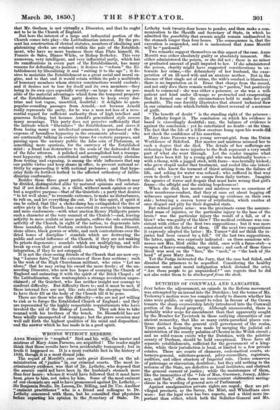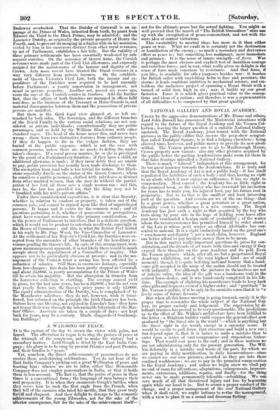DUTCHIES OF CORNWALL AND LANCASTER.
Sou before the adjournment, an episode in the Reform movement was attempted by an inroad into the Dutchies ; but the terms of Mr. Trelawny's motion were too complex clearly to discern whether his aims were public, or only meant to relax in favour of the Crown tenants the sharp overseership lately. introduced into the Cornwall portion of the Royal property. Although unsuccessful, there is probably wider scope for amendment than that apparently sought by the Member for Tavistock in' these outlying obscurities of our ancient monarchy, that like so many extra-parochial places con- tinue distinct from the general civil government of the realm. Years past, a beginning was made by merging the judicial ad- ministration of the county palatine of Chester in the Welsh circuit ; and no solid reason exists why the Dutohies, with the palatine county of Durham, should be held exceptional. These have all separate establishments, sufficient for the government of a king- dom, while their jurisdiction is local, or limited to a few private estates. There are courts of chancery, ecclesiastical courts, at- torneys-general, solicitors-general, privy-councillors, registrars, auditors, and other etezetera of Imperial rule. Choice conserves of patronage or sinecurism, doubtless ; but they add nothing to the revenue of the State, are defective as local institutes, and obstruct the general current of justice ; while the maintenance of them, like the immunities of the " Isle of Man, Guernsey, Jersey, Alder- ney, and Sark," often forms an inconvenient obstructive saving- clause in the wording of general acts of Parliament.
Against amalgamation private rights are urged ; they are pri- vileged precincts, as the Savoy, the Mint, and Whitefriars once were : but the legal view has two aspects, and a third more im- portant than either, which both the Solicitor-General and Mr. Irelawny overlooked. That the Dutchy of Cornwall is an ap- panage the Prince of Wales, inherited from birth, by grant from
d the Third to the Black Prince, may be admitted ; and the Lancaster Distohy, as originally the private property of Henry the Fourth, and, to prevent its merging in a higher title on his accession, vested by him in his successors distinct from other royal revenues, by act of Parliament, establishes a fair title. But the validity of these primary settlements has been essentially weakened by sub- sequent statutes. On the accession of Queen Anne, the Cornish revenues were made part of the Civil List allowance, and expressly assigned for the maintenance of the honour and dignity of the Crown. Acts more recent have treated the Ducal revenues in a way very different from private incomes. On the establish- ment of Queen Victoria's Civil List, both the income and ex- penditure of the Dutchies were required to be laid annually before Parliament; a yearly supervision in management, not usual in private property. Another act, passed six years ago, vests the care of the Cornish estates in trustees. Add the further fact, that the affairs of both Dutchies are managed in offices held rent-free, as the business of the Treasury or Horse Guards is, and material discrepancies between them and the possessions of private persons are manifest. But there is the third legal view glanced at, as left un- touched by both sides. The Sovereign., and the different branches of the Royal Family in the various social relations, are not con- sidered as private individuals ; constitutionally they are public personages, and so held by Sir William Blackstone with other standard sages. The head of the house never dies, and never does wrong : these form two distinctive features from ordinary people. If they do happen to die in the vulgar fashion, they are buried at the public expense,---which is not the case with common persons, unless there are no assets to defray the under- taker's charges. If a royal person marries, he or she is privileged. by the grant of a Parliamentarydotation ; if they have a child, an additional allowance is made ; if they incur debts they are unable to pay, public provision has usually been made discharge to them. The exemption from road-tolls is too trivial for notice. But Black- stone especially dwells on the status of the Queen Consort; whom he considers a public personage, clothed with privileges so distinct from other married women, that she may do without the partici- pation of her lord all those acts a single woman can : and this, says he, the law has provided for, that the Ki g may not be " troubled with his wife's private affairs." Under these constitutional expositions, it is clear that Royalty, whether in relation to conduct or property, is taken out of the common pale, and cannot be argued upon like that of unprivileged persons. It began and it exists for the common -weal ; and all questions pertaining to it, whether of possessions or prerogatives, must have constant reference to this primary consideration. A; to the power of Parliament to interfere, that is a delicate question, which it would not be prudent to entertain needlessly, especially in the House of Commons : and this is what Sir Robert Peel hinted in his reply to Mr. Page Wood, the Vice-Chancellor of Lancaster. At the settlement of her Majesty's Civil List, the Dutchies were ex- cepted from the surrender of other branches of the hereditary re- venues pending the Queen's life. In spite of this arrangement, were gross =management apparent, it is not likely there would be much scruple about the appointment of a Committee of inquiry. This appears not to be particularly obvious at present; and in the ma- , nn.einent of the Cornish trust a saving has been effected by a reduction of salaries. Still there is enormous leakage, especially from law-charges: this drain has been partly stopped in Cornwall, and about 2a,000/. is yearly accumulating for the Prince of Wales till he attain his majority. But the absorption in transitu from the Lancaster collection is startling. The average annual yield in gross, for the last nine years, has been 32,0001.; but the net sum that yearly flows into the Queen's privy purse is only 12,0001. The equity administration of the Dutchy, too, is complained of by the Manchester solicitors : they do not, however, wish it trans- ferred, but reformed on the principle the Irish Chancery has been. Suitors have one blessing, not enjoyedin Lincoln's Inn—they have p.ot to pay their way through the interminable labyrinth of the Mas- ters' Offices. Accounts are taken in a couple of days—not kept back for years, may be a century. Blush, sluggards of Southamp- ton Buildings'



























 Previous page
Previous page